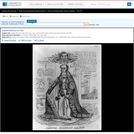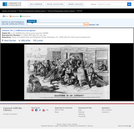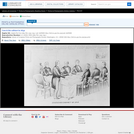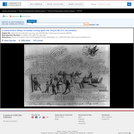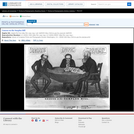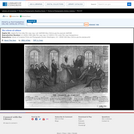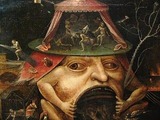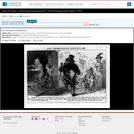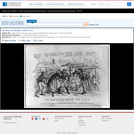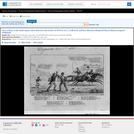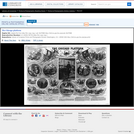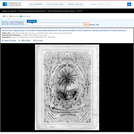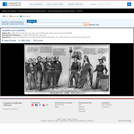
Sharply critical of both the Democratic and Whig choice of presidential candidates in 1852, the artist laments the nomination of two soldiers, Winfield Scott (center) and Franklin Pierce (far right), in preference to several more "capable" statesmen who appear at left. The latter are (left to right): Samuel Houston, John J. Crittenden, Thomas Hart Benton, Millard Fillmore, John Bell, Lewis Cass, Stephen A. Douglas, and Daniel Webster. Most prominent in the group are Fillmore, Cass, and Webster, who also sought the presidential nomination in 1852. Fillmore: "I have sought more anxiously to do what was right; than what would please, and feel no disappointment, at finding that my Conduct has, rendered me an unavailable candidate." Cass: "We have been partizans where we differed in opinions as to the best means of promoting the prosperity and happiness of our native land, but we cast aside, party when we stood Shoulder, to Shoulder, for the Constitution & the Union." Webster: "It is not our fortune to be, or to have been successful Millitary Chieftains. We are nothing but painstaking, hardworking, drudging Civilians, giving our life, and health, and strength, to the maintenance of the Constitution and upholding the liberties of our country." Columbia, draped in stars and stripes and grasping the hands of Scott and Pierce, responds: "I acknowledge your noble services, worth and Constant devotion most Illustrious sons, and that you have the long experience, Sound sense and practical wisdom which fit you to receive the highest honor in my power to bestow, but you are "not Available." " "Availability," in the contemporary lexicon, meant the quality of broad popular appeal. Scott and Pierce were both distinguished in the Mexican War. Scott, holding a liberty staff and Phrygian cap, proclaims: "You see Gentlemen it is "availability" that is required and that is "my" qualification." Pierce holds a shield adorned with stars and stripes, adding, "I am a "Great" man and have done the country "Great" Service! I never knew it before; but it "must be so;" for the Convention has declared it, and the Democracy affirm it." Before his nomination by the Democratic convention of 1852, Pierce was a relatively little known New Hampshire attorney--a fact which Whig publicists tended to exaggerate. Pierce had, after all, served as a two-term congressman and senator from New Hampshire.|Lith. & pub. by Nathaniel Currier, 152 Nassau St. N.Y.|Title appears as it is written on the item.|Gale, no. 880.|Weitenkampf, p. 107.|Forms part of: American cartoon print filing series (Library of Congress)|Published in: American political prints, 1766-1876 / Bernard F. Reilly. Boston : G.K. Hall, 1991, entry 1852-14.
- Subject:
- History
- U.S. History
- Material Type:
- Diagram/Illustration
- Primary Source
- Provider:
- Library of Congress
- Provider Set:
- Library of Congress - Cartoons 1766-1876
- Date Added:
- 06/08/2013

